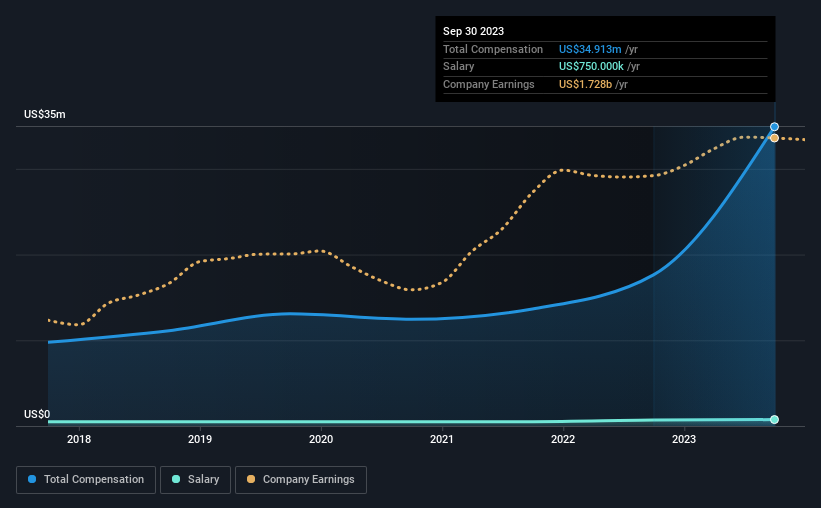We Think Some Shareholders May Hesitate To Increase Raymond James Financial, Inc.'s (NYSE:RJF) CEO Compensation
Key Insights
Raymond James Financial to hold its Annual General Meeting on 22nd of February
Salary of US$750.0k is part of CEO Paul Reilly's total remuneration
The total compensation is 122% higher than the average for the industry
Raymond James Financial's EPS grew by 25% over the past three years while total shareholder return over the past three years was 60%
Under the guidance of CEO Paul Reilly, Raymond James Financial, Inc. (NYSE:RJF) has performed reasonably well recently. In light of this performance, CEO compensation will probably not be the main focus for shareholders as they go into the AGM on 22nd of February. However, some shareholders may still be hesitant of being overly generous with CEO compensation.
See our latest analysis for Raymond James Financial
Comparing Raymond James Financial, Inc.'s CEO Compensation With The Industry
At the time of writing, our data shows that Raymond James Financial, Inc. has a market capitalization of US$24b, and reported total annual CEO compensation of US$35m for the year to September 2023. That's a notable increase of 98% on last year. While this analysis focuses on total compensation, it's worth acknowledging that the salary portion is lower, valued at US$750k.
In comparison with other companies in the American Capital Markets industry with market capitalizations over US$8.0b, the reported median total CEO compensation was US$16m. Hence, we can conclude that Paul Reilly is remunerated higher than the industry median. Furthermore, Paul Reilly directly owns US$30m worth of shares in the company, implying that they are deeply invested in the company's success.
Component | 2023 | 2022 | Proportion (2023) |
Salary | US$750k | US$688k | 2% |
Other | US$34m | US$17m | 98% |
Total Compensation | US$35m | US$18m | 100% |
On an industry level, around 9% of total compensation represents salary and 91% is other remuneration. Raymond James Financial has chosen to walk a path less trodden, opting to compensate its CEO with less of a traditional salary and more non-salary rewards over the last year. If non-salary compensation dominates total pay, it's an indicator that the executive's salary is tied to company performance.
A Look at Raymond James Financial, Inc.'s Growth Numbers
Raymond James Financial, Inc.'s earnings per share (EPS) grew 25% per year over the last three years. In the last year, its revenue is up 8.4%.
Shareholders would be glad to know that the company has improved itself over the last few years. It's good to see a bit of revenue growth, as this suggests the business is able to grow sustainably. Looking ahead, you might want to check this free visual report on analyst forecasts for the company's future earnings..
Has Raymond James Financial, Inc. Been A Good Investment?
Boasting a total shareholder return of 60% over three years, Raymond James Financial, Inc. has done well by shareholders. As a result, some may believe the CEO should be paid more than is normal for companies of similar size.
In Summary...
Raymond James Financial prefers rewarding its CEO through non-salary benefits. The company's decent performance might have made most shareholders happy, possibly making CEO remuneration the least of the concerns to be discussed in the upcoming AGM. Still, not all shareholders might be in favor of a pay raise to the CEO, seeing that they are already being paid higher than the industry.
While CEO pay is an important factor to be aware of, there are other areas that investors should be mindful of as well. We've identified 1 warning sign for Raymond James Financial that investors should be aware of in a dynamic business environment.
Important note: Raymond James Financial is an exciting stock, but we understand investors may be looking for an unencumbered balance sheet and blockbuster returns. You might find something better in this list of interesting companies with high ROE and low debt.
Have feedback on this article? Concerned about the content? Get in touch with us directly. Alternatively, email editorial-team (at) simplywallst.com.
This article by Simply Wall St is general in nature. We provide commentary based on historical data and analyst forecasts only using an unbiased methodology and our articles are not intended to be financial advice. It does not constitute a recommendation to buy or sell any stock, and does not take account of your objectives, or your financial situation. We aim to bring you long-term focused analysis driven by fundamental data. Note that our analysis may not factor in the latest price-sensitive company announcements or qualitative material. Simply Wall St has no position in any stocks mentioned.

